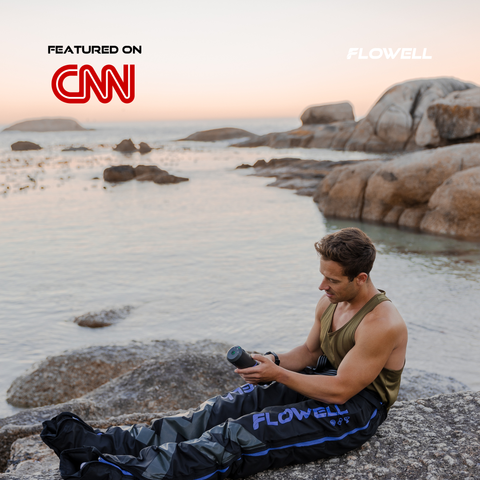Let's be real – there's something both inspiring and slightly crazy about people who wake up at 5 AM to crush a workout before heading to their high-powered jobs. Our friend Chris is one of those people, and trust me, we've given him plenty of grief about it. But here's the thing: watching his journey from burning the candle at both ends to finally discovering what real recovery means has changed how I think about the whole work-hard-play-hard lifestyle.
Picture this: It's 5:30 AM, and while most of us are doing our best impression of a hibernating bear, Chris is already at the gym, his banking suit hanging pristinely in his locker. "The morning crowd knows each other by now," he tells us, laughing. "We're like this weird little cult of people who chose violence before sunrise." By 8 AM, he's transformed from the guy crushing deadlifts to the polished financial advisor his clients trust with their futures.
For years, this was Chris's normal – pushing through brutal morning workouts, powering through 10-hour days at the bank, and somehow still finding energy for weekend adventures. "I used to wear my perpetual soreness like a badge of honor," he admits. "Like, oh, my legs are killing me? Must mean I'm doing something right." (Spoiler alert: he wasn't.)
The reality check came during what should have been an epic surf trip to Capetown. After a week of sitting through back-to-back client meetings, his legs felt like they were made of concrete. "I'd been so focused on pushing through workouts and crushing it at work that I completely ignored what my body was telling me," he says. "There I was, in paradise, and I could barely pop up on my board because my legs were so tight from all the sitting and training."
That's when a fellow gym rat introduced him to Flowell compression pants. Now, let me pause here – Chris is the most skeptical person I know when it comes to fitness gear. This is the guy who once went on a 20-minute rant about "overpriced rubber bands" (resistance bands, for the uninitiated). So when he told me he was giving compression therapy a shot, I nearly choked on my protein shake.
But here's where the story gets interesting. Chris started using his Flowell pants during his evening wind-down routine – those precious hours between leaving the office and crashing for his early morning wake-up call. "At first, I felt ridiculous sitting there watching Netflix with these things on," he admits. "But after a few sessions, I noticed something wild – my legs didn't feel like lead weights during my morning workouts anymore."
"At first, I felt ridiculous sitting there watching Netflix with these things on," Chris admits.
The science behind compression therapy isn't exactly new, but the way Chris integrated it into his routine was a game-changer. Instead of treating recovery as this separate, time-consuming thing, he made it part of his existing habits. Working from home? Flowell pants on. Catching up on emails? Compression time. "It's like getting a massage while doing the things I'd be doing anyway," he explains. "And my legs thank me for it during those 5 AM sessions."
But the real transformation wasn't just physical. As Chris's recovery improved, something shifted in his mindset too. He stopped wearing exhaustion like a merit badge and started viewing recovery as crucial as the workouts themselves. "It's funny," he reflects, "I always thought taking time to recover meant I wasn't pushing hard enough. Now I realize it's what allows me to push harder, both in the gym and at work."
The change was noticeable to everyone around him. His colleagues stopped asking if he was okay after seeing him wince while standing up from his desk. His workout numbers improved, not because he was training more, but because his body was actually recovering between sessions. And perhaps most importantly, his weekend adventures became more adventurous.
Here's what gets us about Chris's story – it's not about some miracle transformation or extreme lifestyle overhaul. It's about a guy who was already doing all the "right" things learning that sometimes, doing less is actually doing more. The Flowell pants became more than just recovery gear; they were a daily reminder to take care of himself, even in the midst of his ambitious schedule.
For all the other Chris's out there – the early risers, the desk warriors, the weekend athletes – his message is simple: Recovery isn't what happens when you're done pushing yourself. It's what enables you to keep pushing, day after day, without burning out.
As we wrap up this story about our friend, we can't help but laugh at how far he's come from the guy who used to brag about his perpetual soreness. These days, he's still the first one at the gym and the last one to leave the office, but there's a sustainability to his hustle that wasn't there before. And if you catch him zoning out during a late-night video call with his Flowell pants on, well, now you know why.
Because sometimes, the secret to going hard isn't about pushing through the pain – it's about being smart enough to take care of yourself along the way.






